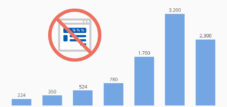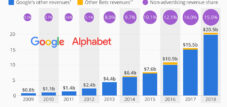The EU Commission and Google: A chronicle of the fight against distortions of competition in the technology sector
Language selection 📢
Published on: March 21, 2019 / Update from: April 23, 2025 - Author: Konrad Wolfenstein

The EU Commission and Google: A chronicle of the fight against distortions of competition in the technology sector-Image: Xpert.digital
EU vs. Google: A struggle for digital dominance - the chronicle
The Brussels effect: How the Google dispute shapes global tech regulation
The European Union has managed a decisive fight against distortions of competition in the technology sector in recent years, with a special focus on internet giants Google. The history of this conflict recently took an unexpected turn when the Court of the European Union (ECG) lifted a billion dollar fine against the search engine operator. This legal dispute is part of a more comprehensive discussion between the European competitive hostels and the large technology groups that dominate the digital age.
2019: The Adsense penalty and the surprising turn
In March 2019, the European Commission imposed a fine of EUR 1.49 billion against Google due to improper exploitation of its dominant position in the area of online searches. The then competitive commissioner Margrethe Vestager said that Google had consolidated its dominance in the online searching industry through competitive contractual restrictions on third-party websites and thereby protected itself from competitive pressure. Specifically, it was about the Adsense for Search service, which enables operators of websites to integrate Google search masks into their offers and to provide consideration.
The Commission accused Google of cementing its dominant position in the field of search engine advertising since 2006. On closer inspection of these clauses, you come across three particularly problematic elements: the exclusivity clause, the placement clause and the pre -approval clause. These contract components restricted the possibilities of the website operator to show off competing services.
The surprising turn came on September 18, 2024 when the European Union court lifted this antitrust penalty. The Luxembourg judges said that the EU Commission had not sufficiently proven that Google had misused its dominant position in search engine advertising on duty “Adsense for Search”. Although the court confirmed most of the findings of the EU Commission, it pointed out that Google used various exclusive clauses and the Commission did not sufficiently clarify which clauses were used for which periods and which markets were affected.
This decision does not mean the end of the case. The EU Commission is now faced with the election to re-examine the parts in question and then decide again on the imposition of a competitive penalty or to contest the ECG judgment before the European Court of Justice (ECJ). In any case, this judgment is an important stage victory for Google, which weighs particularly after the recent defeat in the Google Shopping case.
The previous cartel procedures against Google
The Adsense penalty was by no means the first confrontation between Google and the European competitive huts. Rather, it represented the third large cartel penalty that the EU Commission had imposed against the technology giants within three years.
2017: The Google Shopping case
The first significant case concerned Google's price comparison service Google Shopping. In June 2017, the Commission imposed a fine of 2.42 billion euros against Google because the company preferred its own price comparison service in the search results. The core of the problem was that Google did not use its algorithm, which defines the ranking of search results after relevance, for Google shopping. Instead, the results of their own service were systematically placed at the top of the search results, while competitive offers appeared below.
According to the Commission, this practice led to a significant disadvantage of competitors and restricted the choice of consumers. Google argued that the preference for its own service was part of a strategy to improve the user experience, but the Commission could not convince.
It is particularly noteworthy that the European Court of Justice recently confirmed the Commission's decision on September 10, 2024. The judges supported the view that Google had abused its market power by preferring the results of their own price comparison to general search results for general search results.
2018: The Android case
The second big case was about Google's Mobile Operating System Android, which runs to around 85 percent of all mobile internet devices worldwide. In July 2018, the EU Commission imposed a record penalty of 4.34 billion euros against Google due to illegal practices in this operating system.
The Commission objected to several aspects of Google's business model. Initially, Google made its operating system available to the device manufacturers free of charge, but made certain conditions. The obligation to install entire Google program packages was particularly problematic if manufacturers wanted to equip their devices with certain Google applications, in particular the Chrome Internet browser.
According to the Commission, this practice led Google to enlarge its market power and restricted both the selection of customers and the competition. Margrethe Vestager argued that the operating system had served as a tool in order to steer the entire internet use of the owners of Android devices through Google's search engine and thus cement its own dominance.
In 2022, the European Union court reduced the punishment to 4.125 billion euros, but essentially confirmed the commission's argument. Google made an appeal against this decision, which is currently still pending at the European Court of Justice.
The effects of antitrust penalties on Google
At first glance, the eight billion euros in fines that the EU Commission imposed on Google may seem impressive. However, they are not a existential threat to a group with an annual turnover of over $ 280 billion.
Nevertheless, the cartel procedures had a noticeable impact on Google's business model. In all three cases, the company had to make changes to its practices. In the case of Google Shopping, competitive offers were placed more visible in the search results. At Android, Google loosened the conditions for device manufacturers and allowed more flexibility to install applications. And even in the case of Adsense, Google removed or changed the controversial contractual clauses before the Commission's final decision in 2016.
These forced adjustments show that despite the financial manageability of the punishments, the cartel procedures have an impact on the technology practices of the technology giant. You have contributed to promoting competition in certain areas and expanding the choice of consumers.
The role of the EU Commission in the regulation of technology companies
The struggle of the EU Commission against Google's distortions is part of a broader strategy for regulating large technology companies. In Brussels, for years it has been wrestled how to prevent few corporations from dominating the digital economy and hindering competition.
A central figure in this fight was Margrethe Vestager, who from 2014 to 2019 as an EU competition commissioner and later acted as an executive vice president for a Europe that was equipped for the digital age. Under its leadership, the Commission did not only against Google, but also against other technology giants such as Apple, Amazon and Facebook (now Meta). The focus was on three main areas: competitive behavior, tax bypass and abuse of the privacy of users.
In addition to the imposition of fines, the EU has also created new legal framework conditions to contain the dominance of large online platforms. Particularly noteworthy is the Digital Markets Act (DMA), which was adopted in 2022 and has been in force since 2023. This law aims to prevent unfair business practices of so -called gatekeers - the largest and most powerful digital platforms - and to promote competition in the digital sector.
The DMA prohibits certain practices that were identified as problematic by the Commission in the antitrust procedures against Google and other companies. This includes, among other things, the self -provision of own services, the use of data from commercial users for their own competition and the prevention of the uninstallation of pre -installed applications.
The criticism of EU cartel policy
However, the EU's aggressive antitrust policy to technology companies has also caused criticism. Some argue that Europe is hostile to innovation and that excessive regulation horses technological progress. Others see a hidden protectionism in the measures against predominantly American companies.
Google itself has repeatedly contested the decisions of the Commission and argued that his practices promoted the competition, did not disabled. After the impression of the Android penalty, a Google spokesman said that Android made more choice for everyone. From the company's point of view, free services and products are an advantage for consumers, not an abuse of a dominant position.
However, proponents of EU politics replace that large technology companies are subject to special responsibility due to their enormous market power. They argue that markets can only work efficiently if a fair competition is guaranteed and that the Commission protects precisely this fair competition through its interventions.
The global effects of EU cartel policy
The EU cartel decisions have an impact far beyond the borders of Europe. Since many technology companies act globally, changes to their business models in Europe often lead to global adjustments. This is referred to as the “Brussels effect”-the EU's ability to set global standards through its regulations.
In addition, the European measures also inspired antitrust authorities in other parts of the world. In the United States, for a long time reserved in the regulation of technology companies, the mood has changed in recent years. Both the Federal Trade Commission and the Ministry of Justice have initiated investigations against Google, Amazon, Apple and Facebook. Similar initiatives were also started in countries such as Australia, Japan and South Korea.
This global convergence in antitrust policy indicates that the debates initiated by the EU are increasingly regarded as justified concerns that are relevant across political and geographical borders.
The future of the argument between Google and the EU
The decision of the ECG to cancel the Adsense penalty marks an important milestone in the long-term discussion between Google and the EU, but it in no way means the end of the conflict. As Sarah Blazek, partner of the Noerr law firm, notes, the court makes it clear that even in the case of Big Tech, there are no standards of its own. The Commission must take all relevant circumstances into account and work properly.
Nevertheless, it can be expected that the Commission will hold on to its confrontation course against the large technology companies. The Digital Markets Act offers it new instruments that go beyond traditional antitrust law and take preventive action against potential distortions.
For Google and other technology companies, this means that they still have to deal with a strict regulatory supervision in Europe. You may have to adjust your business models even more to meet European requirements.
The challenge for the EU is to create a regulatory framework that protects fair competition and the rights of consumers on the one hand, but also leaves room for innovation and growth. The decisions in Google cases show that this is a difficult balancing act that requires constant review and adaptation.
The broader importance of the conflict for the digital economy
The discussion between Google and the EU Commission raises fundamental questions about the nature of the digital economy and the appropriate role of regulation in this area. Digital markets have special properties that distinguish them from traditional markets, such as network effects that can lead to the concentration of market power, or the central role of data as a competitive factor.
These special features present the conventional instruments of antitrust law for challenges. The EU reacted to this with a combination of traditional antitrust processes and new regulatory approaches such as the Digital Markets Act. However, the Google case shows that this approach is not without difficulty and that the courts play an important role as corrective.
For companies, in particular start-ups and medium-sized companies that work in the digital area, the regulation of gatekeers such as Google creates new opportunities. If the dominant platforms are prevented from abusing their market power, this could lead to a more open and dynamic digital ecosystem.
The struggle for fair competition in the digital economy of Europe
The history of the EU cartel proceedings against Google reflects the greater conflict between the growing market power of global technology companies and the endeavor of the regulatory authorities to ensure fair competition and the protection of consumers. The most recent decision of the ECG in the case of Adsense shows that this conflict is complex and does not offer any simple solutions.
The 1.49 billion euro punishment, which was initially imposed and later lifted, is part of a larger pattern of clashes that also include Google Shopping and Android. Together, these cases not only led to significant financial punishments, but also to changes in Google's business practices and the development of new regulatory framework such as the Digital Markets Act.
While the EU Commission continues its efforts to contain the market power of large technology companies, these companies have to adapt their business models and find new ways to operate in accordance with European rules. At the same time, the regulatory authorities must make sure that their measures do not inhibit innovation or unintentionally damage consumers.
The decisions of the European courts in these cases help to find a balance and to ensure that regulation is on a solid legal basis. They remind us that the protection of the competition is an ongoing process that requires constant adaptation and review, especially in a rapidly developing digital economy.
Your global marketing and business development partner
☑️ Our business language is English or German
☑️ NEW: Correspondence in your national language!
I would be happy to serve you and my team as a personal advisor.
You can contact me by filling out the contact form or simply call me on +49 89 89 674 804 (Munich) . My email address is: wolfenstein ∂ xpert.digital
I'm looking forward to our joint project.




























